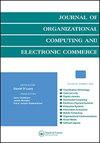目的地管理系统功能的相关性:一个基于利益相关者视角的模型
IF 1.9
4区 管理学
Q3 COMPUTER SCIENCE, INFORMATION SYSTEMS
Journal of Organizational Computing and Electronic Commerce
Pub Date : 2022-01-02
DOI:10.1080/10919392.2022.2036568
引用次数: 2
摘要
摘要目的地管理系统(DMS)已被证明与目的地竞争力相关,即吸引游客和促进目的地利益相关者的协调。先前的研究表明,解释DMS成功的一个原因是能够让基于目的地的玩家采用这些系统并使用其功能。然而,几乎没有研究解释目的地利益相关者对DMS中常见的特定功能的重要性的因素,也没有研究影响这种重要性的因素。这项研究对于设计更有用的DMS和促进这些平台的使用尤为重要。本文考察了影响利益相关者分配给几个DMS功能的相关性的因素。这项实证研究是在葡萄牙的一个地区——葡萄牙NUTS II中心进行的。结果表明,利益相关者对DMS功能的重视程度受到一些因素的影响,如他们对目的地是否准备采用这些系统的看法、DMS的有用性,在某些情况下,还受到他们自己组织的资源和战略愿景、受访者类型、,利益相关者对DMO平台的了解以及与DMO的关系。然而,上述因素的影响因所考虑的功能类型而异。本文章由计算机程序翻译,如有差异,请以英文原文为准。
THE RELEVANCE OF DESTINATION MANAGEMENT SYSTEMS’ FUNCTIONALITIES: A MODEL BASED ON STAKEHOLDERS’ VIEW
ABSTRACT Destination Management Systems (DMSs) have proven relevant to destination competitiveness, namely to attract visitors and foster coordination of destination-based stakeholders. Previous research suggests that one reason explaining the success of DMSs is the ability to engage destination-based players in adopting these systems and in using its functionalities. Nevertheless, there is almost no research on factors explaining the importance that destination-based stakeholders assign to specific functionalities typically found in DMSs, neither on the factors that influence that importance. This research is especially important to design more useful DMSs and promote the use of these platforms. The present paper examines the factors influencing the relevance that stakeholders assign to several DMSs’ functionalities. The empirical study was performed in a Portuguese region – the NUTS II Center of Portugal. Results indicate that the importance given by stakeholders to DMSs’ functionalities is influenced by factors such as their perceptions on the destination’s readiness to adopt these systems, the perceived usefulness of DMSs and, in some cases, by the resources and strategic vision of their own organization, type of respondent, the stakeholders’ knowledge on DMOs’ platforms and affiliation to DMOs. However, the impact of the previously mentioned factors differs according to the kind of functionalities considered.
求助全文
通过发布文献求助,成功后即可免费获取论文全文。
去求助
来源期刊

Journal of Organizational Computing and Electronic Commerce
工程技术-计算机:跨学科应用
CiteScore
5.80
自引率
17.20%
发文量
7
审稿时长
>12 weeks
期刊介绍:
The aim of the Journal of Organizational Computing and Electronic Commerce (JOCEC) is to publish quality, fresh, and innovative work that will make a difference for future research and practice rather than focusing on well-established research areas.
JOCEC publishes original research that explores the relationships between computer/communication technology and the design, operations, and performance of organizations. This includes implications of the technologies for organizational structure and dynamics, technological advances to keep pace with changes of organizations and their environments, emerging technological possibilities for improving organizational performance, and the many facets of electronic business.
Theoretical, experimental, survey, and design science research are all welcome and might look at:
• E-commerce
• Collaborative commerce
• Interorganizational systems
• Enterprise systems
• Supply chain technologies
• Computer-supported cooperative work
• Computer-aided coordination
• Economics of organizational computing
• Technologies for organizational learning
• Behavioral aspects of organizational computing.
 求助内容:
求助内容: 应助结果提醒方式:
应助结果提醒方式:


